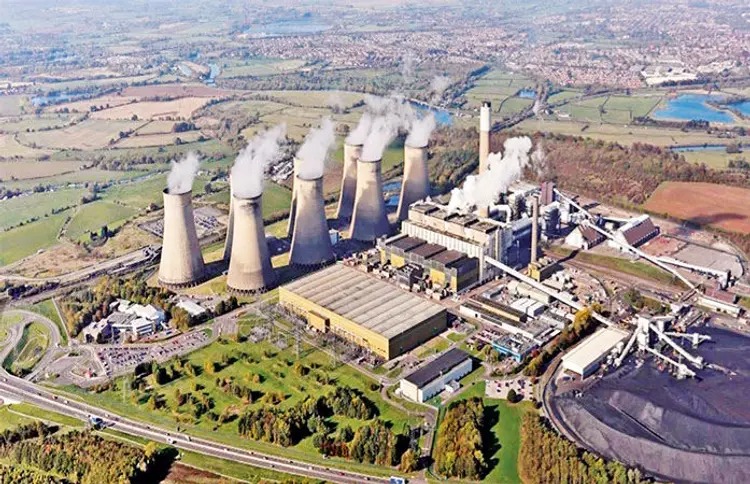
carbon neutral: There has been an uproar in the world about climate change for a long time. But major steps were not taken directly by big countries, rich countries or developed countries. Moving away from this trend, Britain has created its own identity as a carbon neutral country. Britain has been working towards zero carbon emissions for a long time. Recently a big decision was taken on this.
The first coal based power plant was started in Britain
A coal-fired power plant in Britain was closed on the night of 30 September. All the chimneys of this plant will now be closed in a phased manner which will take another two to four years. Importantly, coal-fired power plants were first introduced in Britain in the 18th century, marking the beginning of the Industrial Revolution in the world. With this, Britain has become the first rich country in the world. Due to which the use of fossil fuel coal has been reduced to zero.
Britain is the first among the G-7 countries to take a major step towards becoming carbon neutral by completely ending the use of coal. There are 8 chimneys in this plant and it will take time to eliminate them. This work will be completed in the next 4-5 years. There are about 170 employees in this plant. All these employees will help in closing the plant for the next two years.
A plant called Ratcliffe on Soar was considered in the 1960s. This plant was commissioned in 1968. This plant produced electricity for Britain for more than 50 years. It supplied electricity to about two million homes. The closure of this plant marked the end of 142 years of industrial revolution history. This power plant was very important.
This plant in central England used to generate electricity to provide heat to people in the harsh winter. It provided electricity services to a large population of Britain. Now electricity will be produced in Britain only from factors like water, wind and sunlight. Sweden and Belgium played in this direction.
Among European countries, these two countries had stopped using coal before Britain. France will phase out coal in 2027, Canada in 2030, the US in 2035 and Germany in 2038. Importantly, zero carbon policies were implemented by these countries towards becoming carbon neutral. As part of this, efforts are being made to reduce and phase out the use of fossil fuels and move towards alternative sources. For this, first of all the use of coal is being banned by all the major countries. After this it will move towards petrol and diesel.
India's carbon emissions reduced by 33 percent
A study also states that India has reduced carbon emissions significantly in the last 14 years. Pressure and sanctions were imposed by India in various areas. This has reduced carbon emissions by 33 percent. Some time ago, a report released by the UN said that from 2005 to 2019, India's GDP has declined by a huge 33 percent.
If India continues to work like this then by 2030 this reduction could be up to 45 percent.
Carbon emission reduction accelerated in India after 2014. The pace of carbon emission reduction by India was 1.5 percent from 2014-2016 which reached 3 percent by 2019. According to experts, after 2016, India gave more emphasis on renewable energy. Due to which a huge reduction in carbon emissions has been recorded. Talking about electricity production in India, there has been a huge increase in renewable sources after 2019. 25.3 percent renewable sources are used to generate electricity in the current year.
1 billion people will die due to global warming by the year 2100
Some time ago, a study conducted in Canada revealed the serious effects of global warming. It said that due to the way people are spreading pollution, the earth's temperature is going to increase rapidly in the near future. If the Earth's average temperature increases by 2 degrees Celsius by the year 2100, 1 billion people will die. Experts say most of the one billion people who die will be from poor and developing countries. These will be such people whose contribution in spreading pollution will be minimal.
150 crore tons of carbon emissions will be reduced every year
According to experts, coal and wood are still used on a large scale in Asian countries. China and India are the top consumers of coal. According to experts, if the use of fuels like coal, wood and kerosene is reduced then pollution can also be reduced significantly.
According to a study, if the use of such cooking equipment is stopped then 150 crore tonnes of carbon emissions can be reduced every year. This figure is very big. Not using these devices could reduce the amount of carbon emissions emitted by ships and planes each year. On the other hand, man-hours are also saved on a large scale.
According to the researchers, the man-hours saved by cleaner cooking fuel would be equivalent to Japan's total annual man-hours. It also says that if $8 billion of clean fuel is added annually, clean fuel equipment could be delivered worldwide by 2030. This is only one percent of the total expenditure on public energy equipment by countries around the world last year.
End of an era in Britain: Energy Minister Michael Shanks
Britain's Energy Minister Michael Shanks also gave an emotional reaction on the issue of closure of Ratcliffe Sour Coal Power Plant. He said, 'The closure of this plant marks the end of an era of revolution in Britain. We will remember all those who worked in coal power plants who have demonstrated their potential. No one knows the names of all these people but they have witnessed 140 important years of history and future generations can be proud of their work. The next generation will always be proud and grateful to him.
Today the era of coal has ended in Britain but a new era of clean energy has begun in Britain. Peter O'Grady, manager of this power plant, said, 'This moment is very emotional. We started our career 36 years ago. Then we had no idea that a day would come in the future when Britain would no longer need coal. Britain will produce electricity without the use of coal. We are proud to be a part of Britain's golden history.
Thomas Edison started the first plant in 1882
It is noteworthy that, when the Industrial Revolution started in Britain, research was being done on the method of generating electricity from coal. Meanwhile, huge investments were made in Britain by electricity inventor and businessman Thomas Edison. He established the first coal based power plant in London. He established the Holborn Viaduct Power Station in London in 1882 and began generating electricity from coal. At that time it was the first power station in the world to generate electricity from coal. After that, gradually power plants were started in Britain and by the 2000s, 80 percent of the electricity in Britain started being generated from coal. Then Britain started getting serious about it.
Since 2001, the use of coal has started to decline drastically. Meanwhile, 15 coal-fired power plants were closed. In 2012, coal use for electricity in Britain increased to 39 percent. Then 34 percent, 28 percent and last year only 1 percent coal was used. With the closure of this plant, the use of coal in power plants stopped completely.
 look news india
look news india
